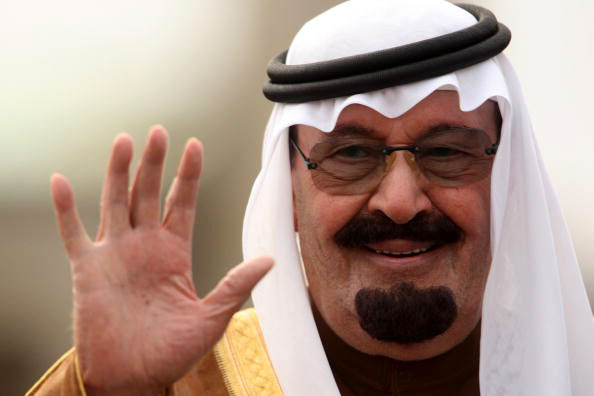Saudi Arabia Feature: Assessing The Regime's Counter-Revolution (Bsheer)
 King Abdullah of Saudi ArabiaRosie Bsheer writes for Jadaliyya:
King Abdullah of Saudi ArabiaRosie Bsheer writes for Jadaliyya:
The contemporary Saudi-led counterrevolution, fierce as it has been throughout the Arab world, is perhaps most relentless inside the Kingdom’s own borders. US-trained and armed security forces have been dispatched more thoroughly throughout the country to thwart any potential signs of public gatherings or protests. In the last year alone, at least eight Saudi nationals have been killed for partaking in public protests. This is in addition to the unrelenting police brutality against unarmed civilians that has injured numerous men and women.
Further, hundreds have been illegally detained across the country for supporting calls for reform and protest. Such violence and intimidation is not only reserved for those who have attempted to take to the streets. Dozens have also been forbidden from travel, placed under house arrest, or banned from writing in the Saudi press simply for criticizing the status quo. Others have been forced to sign formal pledges not to engage in acts that “challenge state laws and norms.” Several blogs have been shut down, and two twitterers have been arrested and today face the possibility of a death sentence. In short, scores of citizens have been intimidated into silence.
The above listed acts only begin to scratch the surface of the lived consequences of the counterrevolutionary campaign inside Saudi Arabia. Compounding this stark reality is the information blackout that the Saudi media empire has succeeded in imposing on local developments. Its outlets have been able to hijack and recreate events, from Sana’a and Manama to Damascus and Muscat. Equally alarming, however, the Saudi-controlled media have largely succeeded in silencing the flow of information on local events both inside and outside the country. Most Internet sites that carry information critical of the Saudi ruling family, as well as those that simply relay calls that challenge the status quo are blocked. This is especially the case for Arabic-language sites and those originating from within the country. Media laws have been made more stringent, and relaying information or images of Saudi protests carries a prison sentence of up to ten years, with thousands of dollars in fines. Little wonder then, that there exists a significant information disconnect among people living in Saudi Arabia and not only those who are abroad. At any given time, residents of most Saudi cities are largely in the dark as to what is happening only a few kilometers away, let alone in other Saudi cities.
Increasingly stricter laws, coupled with the media blackout, nonetheless stand in contrast to small yet consistent protests across the Kingdom. Every week, Saudi men and women gather at the country’s various ministries to make the simplest of demands, including increasing wages, being permanently reinstated in jobs as was promised, getting paid on time, and obtaining long overdue land or cash grants. Despite their regularity, these gatherings—when news of their occurrence actually reaches the media—are repackaged as officials opening their doors to average citizens to solve their problems. At the Ministry of Interior in Riyadh, protests demanding the release of political prisoners—a weekly occurrence only a few years ago—have all but stopped in the last ten months given the heightened attention they have garnered. Until a few weeks ago, when the issue of political prisoners was resurrected again, any mention of prisoner rights was summarily dismissed as a strictly Shi’a demand, which—in the sectarian Saudi media parlance—means it is not really a national issue that merits attention.
Acts of protest have not been limited to the government ministries. Employees from different departments of such larger-than-life companies as Saudi Airlines and the Saudi Telecom Company (STC) have gone on strike for days, at times weeks, due to widespread corruption, deteriorating employment conditions, and on-the-job discriminatory practices. Several times, these employees were able to momentarily shut down one of Riyadh’s busiest intersections on Olaya Street facing the Kingdom Tower, before riot police quickly dispersed them. In early March 2012, following major student protests at Riyadh’s King Saud University, over five thousand women gathered at the King Khalid University in Abha. Contrary to media and official claims, which were overwhelmingly sectarian and dismissive in tone, the female students had been voicing their anger at corrupt administrative measures, discriminatory gender practices, and increasingly restrictive policies. Campus security allowed state police to enter the university in order to put down the protest. As a result, one student was killed, another had a miscarriage, and over forty others were seriously injured. The story was quickly repackaged in the local media as one of female students protesting, of all things, garbage at their university. The protesters allegedly attacked university employees and in the process hurt themselves and each other. As with other incidents in Saudi Arabia that require serious investigation, a commission was appointed to look into the matter while the “culprits” were forced to sign pledges and apologize for their actions.
Behind closed doors, Saudis of all walks of life talk freely about the corrupt regime and the irony of its support for the overthrow of Bashar al-Assad’s regime after having brutally suppressed protesters in equally authoritarian Bahrain. Not surprisingly, however, the most vocal criticism and acts of opposition to Al Saud have occurred in Qatif and its surroundings in the Eastern Province. Such protest is rarely mentioned in Saudi Arabia, let alone recognized, even by those who elsewhere in the country could be said to have common cause with them. In Qatif, the landscape of revolt has been drastically altered since I last visited in June. On the intersection of Riyadh Street and King Abdulaziz Road in Qatif, Revolution Roundabout—the starting point of almost-weekly Friday protests—has been demolished. Traces of it, however, are visible on the ground. Its importance as a symbol of solidarity and defiance remains etched in people’s memories.

 Tuesday, April 3, 2012 at 10:53
Tuesday, April 3, 2012 at 10:53
Reader Comments